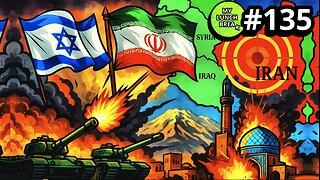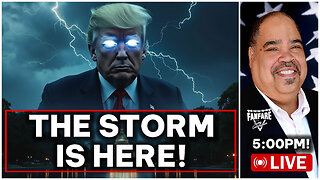Premium Only Content

Hitler's Speech in Memel - March 23, 1939
Background Leading Up to Hitler's Speech in Memel - March 23, 1939
Occupation of Czechoslovakia: In March 1939, Hitler’s forces occupied the remaining parts of Czechoslovakia, turning the country into a German protectorate. This marked a significant escalation in Nazi Germany’s expansionist policy.
International Reaction: The occupation of Czechoslovakia alarmed Europe. The Munich Agreement of September 1938, which allowed Germany to annex the Sudetenland, was supposed to guarantee no further territorial expansion. Hitler’s actions shattered this promise, increasing tensions across Europe.
Annexation of Memel: On March 22, 1939, following a German ultimatum, Lithuania ceded the Memel Territory to Germany. This region had been separated from Germany after World War I by the Treaty of Versailles, and its return was another step in Hitler's aim to reunite all ethnic Germans.
Key Points of Hitler's Speech:
Celebration of Memel's Return: Hitler began by celebrating the return of the Memel Territory to Germany. He portrayed this as a restoration of historical and ethnic justice, reuniting ethnic Germans with the Reich.
National Pride: Emphasizing national pride, Hitler spoke of the unity and strength of the German people. He highlighted the resolve and determination that had made the recovery of Memel possible.
Critique of the Versailles Treaty: Hitler reiterated his longstanding critique of the Treaty of Versailles, which he deemed unjust and humiliating for Germany. He framed the return of Memel as a correction of one of the many wrongs imposed by the treaty.
Vision of Peace: Despite the aggressive actions, Hitler claimed that Germany sought peace and stability in Europe. He argued that his actions were aimed at creating a harmonious order based on ethnic unity and historical justice.
Appeal for Support: Hitler called for continued support from the German people. He stressed the importance of national unity and solidarity in achieving the country’s goals and facing future challenges.
Analysis:
Legitimizing Expansion: Hitler’s speech aimed to legitimize the annexation of Memel by framing it as a rightful reunification of ethnic Germans with their homeland. He presented it as a rectification of the historical wrongs of the Versailles Treaty.
Nationalist Rhetoric: The emphasis on national pride and unity was designed to rally domestic support and to foster a sense of collective achievement among Germans. Hitler sought to inspire confidence in his leadership and in the nation’s direction.
Critique of Versailles: By criticizing the Versailles Treaty, Hitler reinforced the narrative that Germany had been wronged and that his actions were necessary to restore justice and dignity. This critique resonated with many Germans who felt humiliated by the post-World War I settlement.
Peaceful Intentions: Claiming peaceful intentions served to counter international criticism and to present Germany as a nation seeking stability rather than conflict. Hitler aimed to portray his actions as defensive and justified, despite their aggressive nature.
Mobilizing Support: The appeal for support was a strategic move to consolidate internal backing and to prepare the German people for potential future actions. Hitler emphasized the need for unity and collective effort in achieving the nation’s objectives.
Overall, Hitler's speech on March 23, 1939, celebrated the return of the Memel Territory as a triumph of national pride and justice. It aimed to justify Germany's expansionist actions, critique the Versailles Treaty, and reinforce domestic support for the Nazi regime, while portraying a vision of peaceful intentions in Europe.
-
 1:01:56
1:01:56
Man in America
14 hours agoVICTORY! DOJ Drops All Charges Against Doctor Who Defied COVID Tyranny w/ Dr. Kirk Moore
49.6K34 -
 7:30:55
7:30:55
RalliedLIVE
11 hours ago $15.93 earnedHIGH OCTANE WARZONE SOLOS ALL DAY
82.2K3 -
 5:03:19
5:03:19
Spartan
6 hours agoSpartan - Pro Halo Player for OMiT | Ranked
23.7K1 -
 1:57:36
1:57:36
DLDAfterDark
5 hours ago $5.11 earnedGuns Aren't Political - The Gun Owners Leadership Summit AKA G.O.A.L.S in Aug!
24.3K2 -
 1:57:36
1:57:36
BlackDiamondGunsandGear
6 hours agoAfter Hours Armory LIVE w/ DLD After Dark and Tiberious Gib
18.3K -
 1:15:42
1:15:42
The Connect: With Johnny Mitchell
1 day ago $8.22 earnedHow Did This Happen? Male Escort Who Testified Against Diddy Exposes LIES About Government's Case
36.8K7 -
 21:25
21:25
MYLUNCHBREAK CHANNEL PAGE
11 hours agoIran: The Target
43.8K17 -
 4:20:29
4:20:29
Midnight In The Mountains
7 hours agoMidnight In The Mountains | Episode 6 | Feat: Joker & VapinGamers | Caught On Camera!
38K5 -
 2:41:18
2:41:18
Barry Cunningham
11 hours agoIT IS UPON US! PRESIDENT TRUMP IS BRINGING A FIERCE STORM TO WASHINGTON, DC!
85.3K120 -
 12:23
12:23
Exploring With Nug
1 day ago $5.89 earnedSUV Found In Private Pond While Searching For Missing Man!
47K7